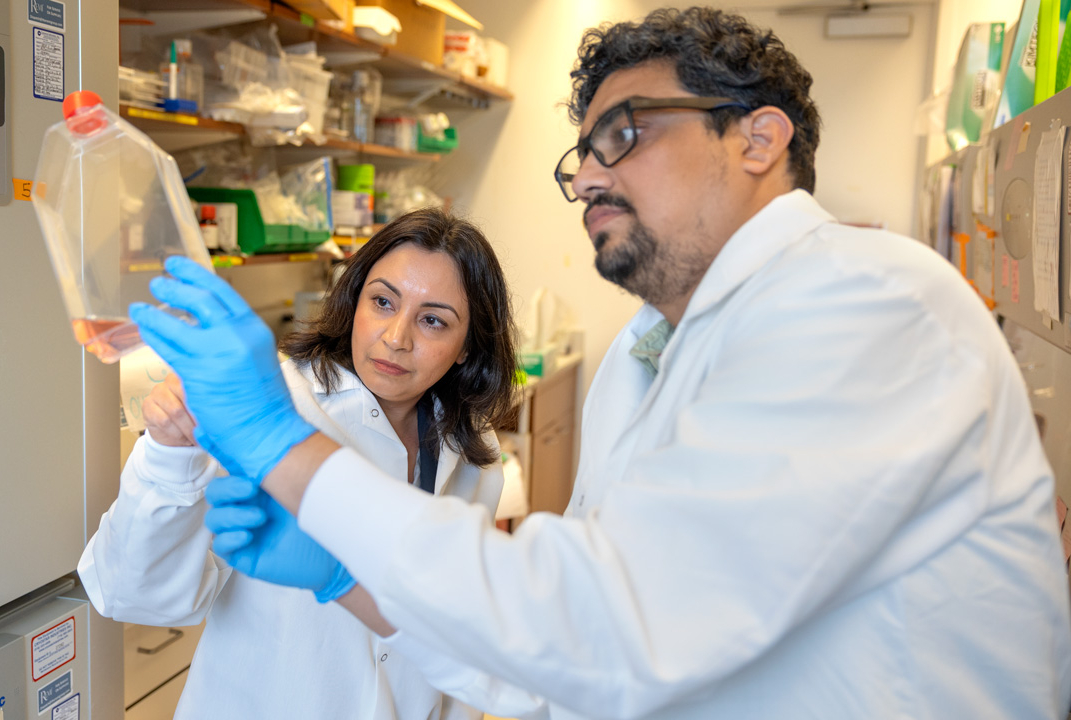
Advances in prostate cancer early detection and treatment have improved outcomes in men diagnosed with the disease. Yet doctors and scientists have long been vexed by a question: Why do most men whose prostate cancer initially responds to hormonal-blocking therapy later develop a lethal, treatment-resistant form of the disease?
It’s a question that Dr. Ekta Khurana, an associate professor of systems and computational biomedicine at Weill Cornell Medicine, has been dedicated to answering. Three years ago, Dr. Khurana and her colleagues at Memorial Sloan Kettering Cancer Center were the first scientific team to identify four distinct subtypes of treatment-resistant prostate cancer, known as castration-resistant prostate cancer, along with the molecules that drive their growth. The discovery led to a $1.2 million, three-year grant from the Department of Defense to determine if DNA markers in patients’ blood can predict treatment resistance, as well as identify drugs that may halt the cancer’s growth.
Dr. Khurana had just completed the grant’s second year when in April the federal government suddenly ordered her to stop. Her work has been paused ever since, threatening the progress she’s made in understanding prostate cancer as well as the careers of the researchers working with her.
“The patients who really need us to work on this and help with stopping the growth of their tumors, they are the ones who will suffer if we cannot do this,” said Dr. Khurana, a WorldQuant Foundation Research Scholar and member of the Sandra and Edward Meyer Cancer Center and Englander Institute for Precision Medicine at Weill Cornell Medicine. “Our work was, hopefully, directly going to increase their survival and decrease mortality.”

Dr. Ekta Khurana, left, associate professor of systems and computational biomedicine at Weill Cornell Medicine, had been making advances in early prostate cancer detection. Khurana is shown here with Udayan Bhattacharya, a researcher in Khurana’s lab. Credit: Devin Flores/Cornell University
Dr. Khurana’s passion for rooting out prostate cancer is as personal as it is professional: Her grandfather died from metastatic prostate cancer many years ago. As a computational biologist who investigates the genetic factors that underpin disease, Dr. Khurana is determined to discover what exactly drives treatment resistance. Her 2022 research revealed a previously unrecognized subtype called stem cell-like, or SCL, which accounts for about 30% of all castration-resistant prostate cancers. Within SCL tumor cells, her team identified a set of proteins that work together to fuel this treatment-resistant disease.
The DoD grant enabled Dr. Khurana and her team to apply sophisticated computational algorithms to scour patients’ DNA looking for the presence of these SCL-driving proteins. This approach, which investigators sought to hone further, has the potential of determining in real time if these patients are developing resistance.
The SCL proteins also offer a promising drug target. Dr. Khurana’s team previously found in petri dishes that two molecules known to interfere with these proteins had slowed the growth of SCL cells. The DoD grant intended to replicate those findings in mice, with the goal of an in-human clinical trial if pre-clinical testing was successful. Now, the team cannot finish that validation.
“This is for the health of the American public,” Dr. Khurana said. “We are trying to solve key challenges that the American public faces, so it’s the best investment to use our knowledge to develop therapies that will be used for Americans.”



